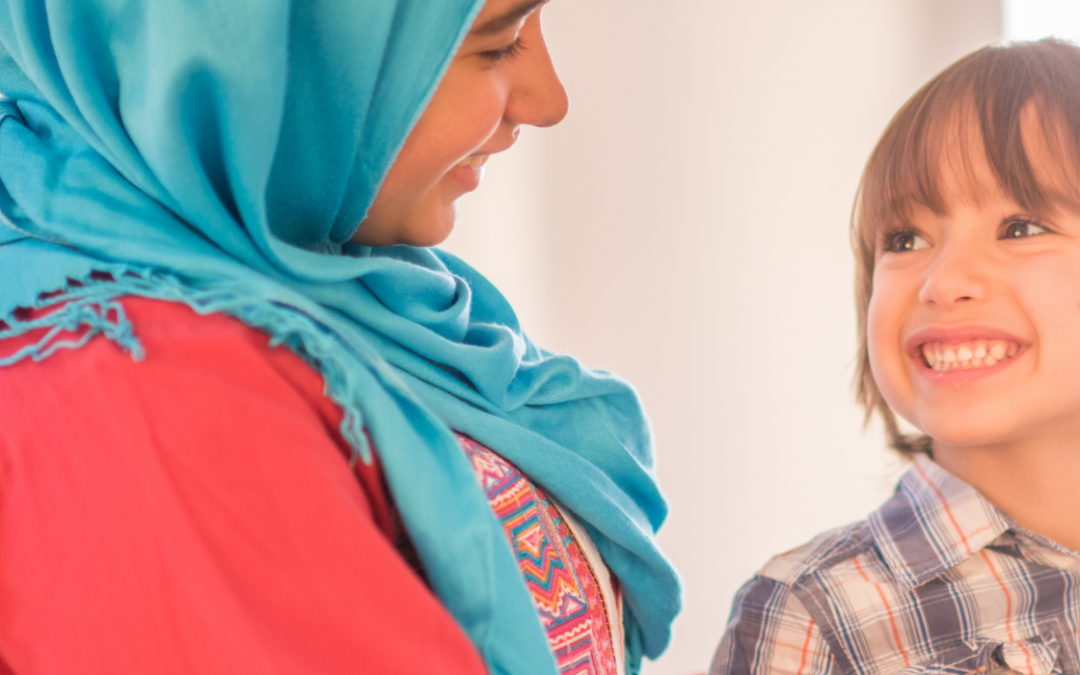Islam places a great emphasis on training children positively and respectfully, so it is incumbent upon parents and educators to pass on to their children and students those values and qualities.
Being positive, patient, and gentle is one of the greatest characteristics that parents and teachers can manifest in dealing with children. Anas bin Malik, the young servant of the Prophet peace be upon him, said “I served the Prophet s.a.w for ten years, and he never said to me, ‘Uff’ (a minor harsh word denoting impatience) and never blamed me by saying, “Why did you do so or why didn’t you do so?” (Al- Bukhari)
The ability to be gentle and have that gentleness appreciated is a blessing from God, especially in the context of the family. The Prophet, peace be upon him, said “Indeed among the believers with the most complete faith is the one who is the best in conduct and the most kind to his family.” (At-Tirmizi)
By talking to our children in a positive and beautiful way, we can bring out the best in them and we can practice the sunnah (the conduct, behavior, and the way of life of our Prophet), as well.
Here is my growing list of beautiful phrases that you can use with your child in the classroom or at home:
- Use “Bismillah” or “in God’s name”– Say “Bismillah” or “in God’s name” at the beginning of every task you undertake. This is a reminder for your child to remember God in everything we do.
- Use “SubhanaAllah” or “praise God” often – Instead of “oh my God!”, try saying “SubhanaAllah” or “praise God”. It’s beautiful when everything in our life reminds us of God and His blessings.
- “Tell me one good thing that happened today” and say “Alhamdullilah” or “thank God” – Focusing on the positive helps us, and those around us, in everything we do. “Al-hamdulillah” or “thank God” is a beautiful message to be kept on the tongue. Al-hamdulillah, thank God, in good times.
- “Tell me one bad thing that happened today” and say “Alhamdullilah” or “thank God” – It is important to talk about the challenges we face, too, and to remember that challenges can provide marvelous opportunities for our learning and growth. Al-hamdulillah, thank God, in difficult times too.
- “I want to listen to you” – Our Prophet used to listen to his children. Let your children know that their words and thoughts are important to us. It contributes to a child’s sense of relevance and conveys that his thoughts and words matter.
- “I am thankful to Allah / God that you are my child / student”– This nurtures in the child, a feeling that he is valued and appreciated, which contributes to his sense of personal worth. It also helps to foster healthy, trusting relationships.
- “I can see you work hard on [XYZ]”– Observe your child at work, think of one positive thing and tell your little one about it. Encouragement is a powerful influence for all of us, and particularly for our children – much more so than praise. Practice using observation and encouragement, for they can be instrumental in nurturing a healthy sense of personal agency in our children.
- “You make me smile”– Our Prophet loved smiling and it’s sadaqah (a charitable or generous act). Tell your children or students that they are the reason for your smile. This will foster a sense of healthy pride which children will internalize over time – and this is a gift that will serve them for a lifetime.
- “Jazak Allah Khyran” or “thank you” – Grace and courtesy are social skills that are important in the home and outside of it, for they demonstrate a respect for self and for others. Modeling grace and courtesy encourages the practice of it, and this will serve our children well, throughout their lives.
- “You can make a difference” – The Quran teaches us to help others and to be there for them. When we remind children that they are important and capable of helping others, they feel empowered. Using encouraging words and phrases and linking them to our religion will go a long way to help children feel safe, appreciated, and proud to be Muslims.
What is your list of positive phrases that you use with your children?
Marah Zabibi holds a BA in English Literature, and a Master’s degree in Elementary Education Administration from the University of Missouri St. Louis. She earned her Montessori teaching credential in Early Childhood Education from Hope Montessori Educational Institute (HMEI) in Lake St. Louis, Missouri. Marah has more than 10 years of experience in teaching and supervision in the field of Early Childhood Education and currently serves as Director of Al -Salam Day School Early Childhood Center.


